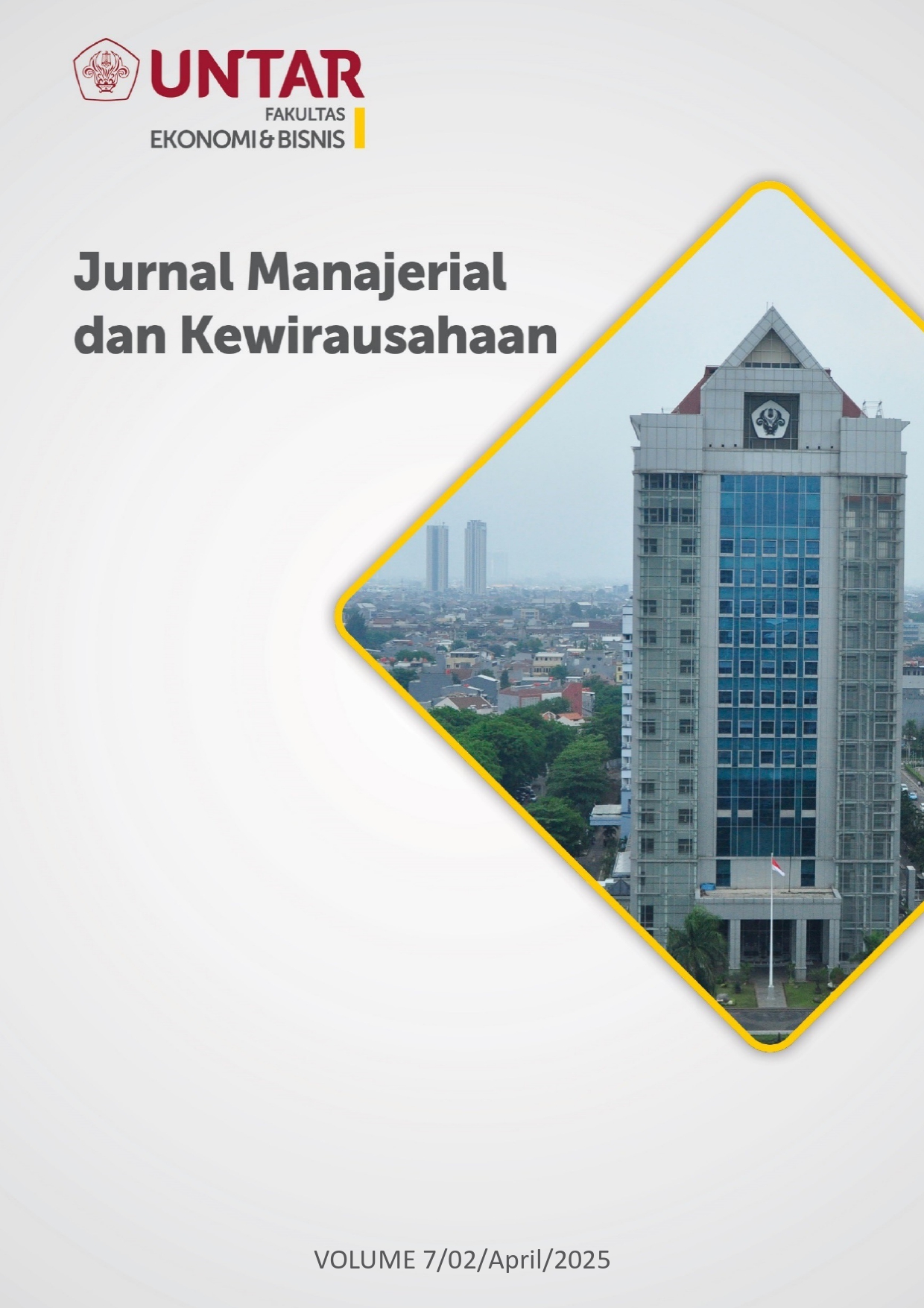Pengaruh Work Design dan Organizational Culture terhadap HR Performance dengan Mediasi Work Motivation di Bank DBS Indonesia
Main Article Content
Abstract
This study aims to explore the relationship between Work Design and Organizational Culture on HR Performance in the context of Work Motivation. The method used is a descriptive method with a quantitative approach using a survey of 36 employees of Bank DBS at Capital Place Building Jakarta, from the DBS Private Bank and DBS Relationship Manager divisions. The results show that Organizational Culture has a significant effect on HR Performance at Bank DBS Indonesia. However, Organizational Culture does not significantly affect Work Motivation. Conversely, Work Design does not significantly affect HR Performance but has a significant effect on Work Motivation. Additionally, Work Motivation does not significantly affect HR Performance and is unable to mediate the influence of Organizational Culture or Work Design on HR Performance at Bank DBS Indonesia.
Article Details

This work is licensed under a Creative Commons Attribution-NonCommercial-ShareAlike 4.0 International License.
This work is licensed under a Jurnal Muara Ilmu Ekonomi dan Bisnis Creative Commons Attribution-ShareAlike 4.0 International License.,/p>
References
Al-Musadieq, M., Nurjannah, N., Raharjo, K., Solimun, S., & Fernandes, A. A. R. (2018). The mediating effect of work motivation on the influence of job design and organizational culture against HR performance. Journal of Management Development, 37(6), 452–469. https://doi.org/10.1108/JMD-07-2017-0239
Chatman, J. A., & Cha, S. E. (2003). Leading by Leveraging culture. California Management Review, 45(4), 20-34. https://doi.org/10.2307/41166186
Chen, J., Jiang, Y., & Xu, J. (2019). Work design influences on employee performance: The mediating role of intrinsic motivation and the moderating role of perceived autonomy. Human Resource Management Review.
Cromwell, H. C., Abe, N., Barrett, K. C., Caldwell-Harris, C., Gendolla, G. H. E., Koncz, R., & Sachdev, P. S. (2020). Mapping the interconnected neural systems underlying motivation and emotion: A key step toward understanding the human affectome. Neuroscience & Biobehavioral Reviews, 113, 204–226. https://doi.org/10.1016/j.neubiorev.2020.02.032
Ghozali, I. (2021). Aplikasi Analisis Multivariate Dengan Program IBM SPSS 26 Edisi 10 (10th ed.). Badan Penerbit Universitas Diponegoro.
Ghozali, I., & Latan, H. (2015). Partial Least Squares Konsep Teknik dan Aplikasi dengan Program Smart PLS 3.0. Badan Penerbit Universitas Diponegoro.
Hair, J. F., Ringle, C. M., Hult, G. T. M., & Sarstedt, M. (2017). A primer on partial least squares structural equation modeling (PLS-SEM). International Journal of Research & Method in Education, 38(2), 220–221. https://doi.org/10.1080/1743727X.2015.1005806
Hasan, I. (2014). Analisis data penelitian dengan statistik (ed 2). Bumi Aksara, Jakarta.
Hasibuan, J. S., & Silvya, B. (2019). Pengaruh Disiplin Kerja dan Motivasi terhadap Kinerja Karyawan. Prosiding Seminar Nasional USM.
Locke, E. A., & Latham, G. P. (2004). What Should We Do about Motivation Theory? Six Recommendations for the Twenty-First Century. The Academy of Management Review, 29(3), 388. https://doi.org/10.2307/20159050
Luthans, F., Luthans, B. C., & Luthans, K. W. (2015). Organizational behavior: An evidence-based approach (Thirteenth edition). Information Age Publishing, Inc.
Michelle, M., & Masman, R. R. (2022). Pengaruh budaya organisasi dan gaya kepmimpinan terhadap kepuasan kerja PT Global Digital Republic di Jakarta. Jurnal Manajerial dan Kewirausahaan, 4(1), 158-164. https://doi.org/10.24912/jmk.v4i1.17186
Oldham, G. R., & Fried, Y. (2016). Job design research and theory: Past, present and future. Organizational Behavior and Human Decision Processes, 136, 20–35. https://doi.org/10.1016/j.obhdp.2016.05.002
Robbins, S. P., & Judge, T. A. (2019). Organizational behavior (18th edition, global edition). Pearson.
Sedarmayanti. (2017). Perencanaan dan Pengembangan Sumber Daya Manusia untuk Meningkatkan Kompetensi, Kinerja, dan Produktivitas Kerja. Refika Aditama.
Simamora, H. (2017). Manajemen Sumber Daya Manusia. STIE YKPN.
Vanessa, V., & Nawawi, M. T. (2022). Pengaruh lingkungan kerja, stres kerja, dan motivasi terhadap kepuasan kerja karyawan. Jurnal Manajerial dan Kewirausahaan, 4(2), 497-506. https://doi.org/10.24912/jmk.v4i2.18257
Wirawan. (2015). Manajemen sumber daya manusia Indonesia: Teori, psikologi, hukum ketenagakerjaan, aplikasi dan penelitian: Aplikasi dalam organisasi bisnis, pemerintahan dan pendidikan (1st edition). Raja Grafindo Persada.



